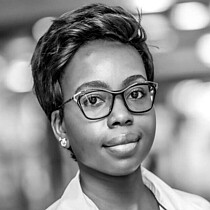Asimwe Ruganyoisa
Nationality: Tanzanian
Age: 30
Last job title: reservoir engineer at Shell in Tanzania
Previous degree and university: master in petroleum engineering at Heriot-Watt University in Scotland

1. Why did you decide to do an MBA at RSM?
“I grew up in Tanzania, electricity isn’t accessible all the time – this affects many aspects of life such as study hours for students. I was lucky enough to live in a city where we had more access than most and I saw this energy poverty was creating an economic divide which pushed me to join the energy industry. I realised there were gaps in my business and sustainability knowledge. To be able to provide energy access, you need to know how to make the deals and make them in a sustainable way. This was the draw to RSM.”
2. What transformation in your professional life are you hoping to achieve?
“I worked in conventional oil and gas. I’m hoping to work in a space where I can solve energy problems in a sustainable way, for example as an energy advisor to help with the energy transition in the industry.”
3. How did you experience studying for your MBA during the Covid-19 pandemic?
“The draw to the MBA was partly to network. Obviously we’re now gaining a different skill: how to network digitally, which is the future. The difficult situation created a need to reach out to people and helped make more meaningful connections with the ones you can access physically. As for actual studying: it’s been intense, like the normal MBA would have been: lots of assignments and group work. But you can expect this of course.”
4. What has been the most challenging assignment or activity during the MBA?
“In the Living Management Project we had to work with a client on a market entry strategy. It was a completely new market and we had to learn so many things, and had to come up with a strategy within a few weeks. It was intense, and really valuable. I could apply my research skills in a more formal setting, and it was a good learning experience to be a consultant and report to a client.”
5. How has the Personal Leadership Development programme (PLD) affected you?
“It gives you a sense of self-reflection: how I view myself, how I view others, and how I can combine those two to become a better leader. You can see the progress throughout the year, and then put it all together. You explore your values and morals, and see the progression.”
6. How would you describe the RSM MBA experience?
“Just being immersed in the very diverse cohort is the biggest learning point. It’s very diverse but also small, so you get to know and work with everyone. It’s important to tap into this huge network. You never know what you can get out of 150 people – there’s so much shared knowledge. Also, with Covid-19, I’m happy to be in the Netherlands which is handling it well. But you can’t compare this MBA year to other years – it’s very unusual.”
7. What advice would you give to people who are considering an MBA?
“The decision to do the MBA was worth it. If you feel like something is missing in your career, then it probably is. Just do it. There is nothing to lose, and so much to gain.”
8. How do you feel about living in Rotterdam/the Netherlands?
“I like living in Rotterdam – it’s well-connected and it’s easy to get to other places. There are a lot of expats, working in all kinds of industries. It’s easy to find a community to engage with outside of the cohort. The Dutch are open and easy to understand, and I love that people speak English so it’s easy to blend in.”
9. After the full-time MBA, what does the future hold?
“I am on sabbatical and still employed by Shell. I want to help Shell in the energy transition towards its goal of reaching net-zero carbon emissions by 2050. This aligns with my sustainability passion. I don’t know where I’ll be, but I’m hoping to stay in the Netherlands.”